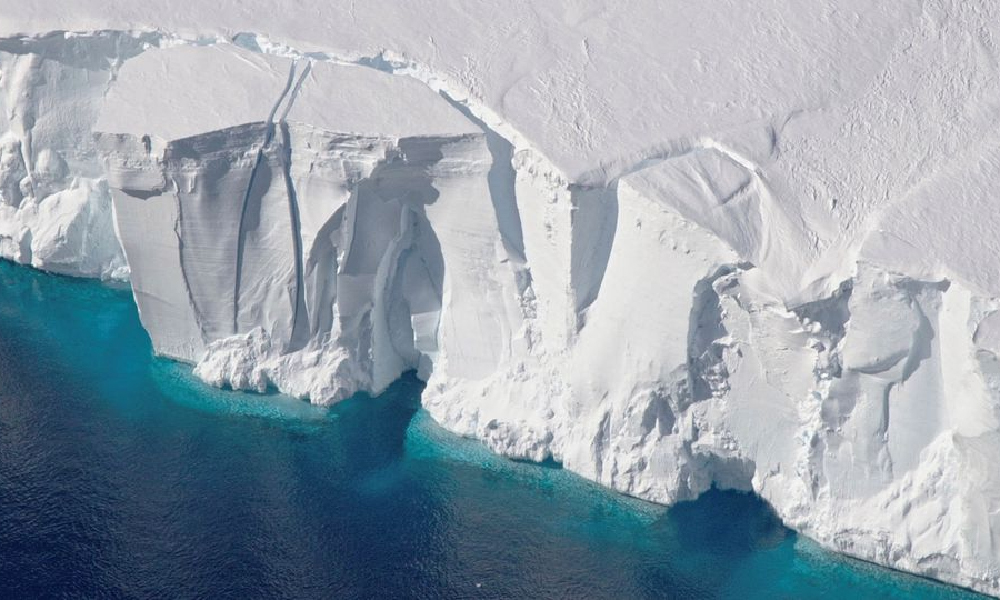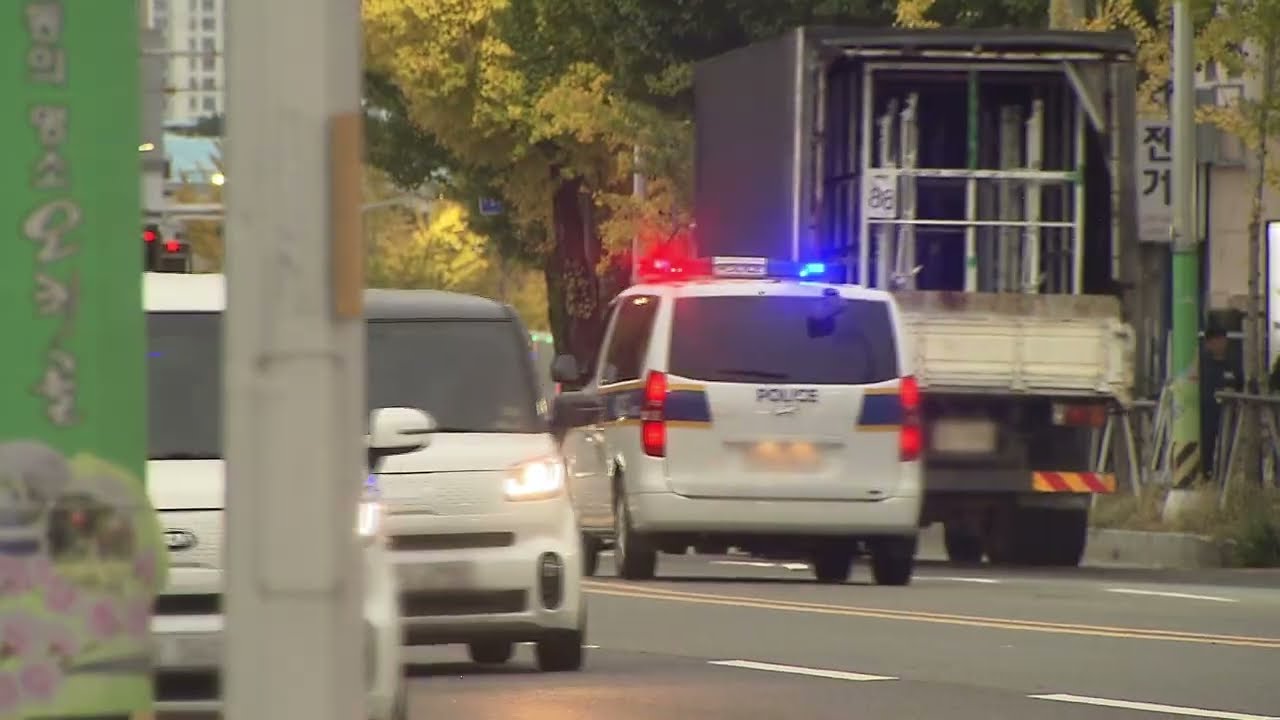Science & Technology
Satellite imagery shows Antarctic ice shelf crumbling faster than thought

Antarctica's coastal glaciers are shedding icebergs more rapidly than nature can replenish the crumbling ice, doubling previous estimates of losses from the world's largest ice sheet over the past 25 years, a satellite analysis showed on Wednesday.
The first-of-its-kind study, led by researchers at NASA's Jet Propulsion Laboratory (JPL) near Los Angeles and published in the journal Nature, raises new concern about how fast climate change is weakening Antarctica's floating ice shelves and accelerating the rise of global sea levels, Reuters reported.
The study's key finding was that the net loss of Antarctic ice from coastal glacier chunks "calving" off into the ocean is nearly as great as the net amount of ice that scientists already knew was being lost due to thinning caused by the melting of ice shelves from below by warming seas.
Taken together, thinning and calving have reduced the mass of Antarctica's ice shelves by 12 trillion tons since 1997, double the previous estimate, the analysis concluded.
The net loss of the continent's ice sheet from calving alone in the past quarter-century spans nearly 37,000 sq km, an area almost the size of Switzerland, according to JPL scientist Chad Greene, the study's lead author.
"Antarctica is crumbling at its edges," Greene said in a NASA announcement of the findings. "And when ice shelves dwindle and weaken, the continent's massive glaciers tend to speed up and increase the rate of global sea level rise."
The consequences could be enormous. Antarctica holds 88% of the sea level potential of all the world's ice, he said.
Ice shelves, permanent floating sheets of frozen freshwater attached to land, take thousands of years to form and act like buttresses holding back glaciers that would otherwise easily slide off into the ocean, causing seas to rise.
When ice shelves are stable, the long-term natural cycle of calving and re-growth keeps their size fairly constant.
In recent decades, though, warming oceans have weakened the shelves from underneath, a phenomenon previously documented by satellite altimeters measuring the changing height of the ice and showing losses averaging 149 million tons a year from 2002 to 2020, according to NASA.
The losses measured from calving outpaced natural ice shelf replenishment so greatly that researchers found it unlikely Antarctica can return to pre-2000 glacier levels by the end of this century.
The accelerated glacial calving, like ice thinning, was most pronounced in West Antarctica, an area hit harder by warming ocean currents. But even in East Antarctica, a region whose ice shelves were long considered less vulnerable, "we're seeing more losses than gains," Greene said.
One East Antarctic calving event that took the world by surprise was the collapse and disintegration of the massive Conger-Glenzer ice shelf in March, possibly a sign of greater weakening to come, Greene said.
Science & Technology
Albania bans TikTok for a year after killing of teenager

Albania on Saturday announced a one-year ban on TikTok, the popular short video app, following the killing of a teenager last month that raised fears over the influence of social media on children.
The ban, part of a broader plan to make schools safer, will come into effect early next year, Prime Minister Edi Rama said after meeting with parents' groups and teachers from across the country, Reuters reported.
"For one year, we'll be completely shutting it down for everyone. There will be no TikTok in Albania," Rama said.
Several European countries including France, Germany and Belgium have enforced restrictions on social media use for children. In one of the world's toughest regulations targeting Big Tech, Australia approved in November a complete social media ban for children under 16.
Rama has blamed social media, and TikTok in particular, for fuelling violence among youth in and outside school.
His government's decision comes after a 14-year-old schoolboy was stabbed to death in November by a fellow pupil. Local media had reported that the incident followed arguments between the two boys on social media. Videos had also emerged on TikTok of minors supporting the killing.
"The problem today is not our children, the problem today is us, the problem today is our society, the problem today is TikTok and all the others that are taking our children hostage," Rama said.
TikTok said it was seeking "urgent clarity" from the Albanian government.
"We found no evidence that the perpetrator or victim had TikTok accounts, and multiple reports have in fact confirmed videos leading up to this incident were being posted on another platform, not TikTok," a company spokesperson said.
Science & Technology
Australia’s under-16 social media ban sparks anger and relief

Australians reacted on Friday with a mixture of anger and relief to a social media ban on children under 16 that the government says is world-leading, but which tech giants like TikTok argue could push young people to "darker corners of the internet".
Australia approved the social media ban for children late on Thursday after an emotive debate that has gripped the nation, setting a benchmark for jurisdictions around the world with one of the toughest regulations targeting Big Tech, Reuters reported.
The law forces tech giants from Instagram and Facebook owner Meta Platforms to TikTok to stop minors from logging in or face fines of up to A$49.5 million ($32 million). A trial of enforcement methods will start in January, with the ban to take effect in a year.
"Platforms now have a social responsibility to ensure the safety of our kids is a priority for them," Australian Prime Minister Anthony Albanese said on Friday
"We're making sure that mums and dads can have that different conversation today and in future days."
Announcing the details of the ban earlier this month, Albanese cited the risks to physical and mental health of children from excessive social media use, in particular the risks to girls from harmful depictions of body image, and misogynist content aimed at boys.
In Sydney on Friday, reaction to the ban was mixed.
"I think that's a great idea, because I found that the social media for kids (is) not really appropriate, sometimes they can look at something they shouldn't," said Sydney resident Francesca Sambas.
Others were more scathing.
"I'm feeling very angry, I feel that this government has taken democracy and thrown it out the window," said 58-year-old Shon Klose.
"How could they possibly make up these rules and these laws and push it upon the people?"
Children, meanwhile, said they would try to find a way around the ban.
"I feel like I still will use it, just secretly get in," said 11-year-old Emma Wakefield.
WORLD FIRST
Countries including France and some U.S. states have passed laws to restrict access for minors without a parent's permission, but the Australian ban is absolute. A full under-14s ban in Florida is being challenged in court on free speech grounds.
Albanese's Labor party won crucial support from the opposition conservatives for the bill that was fast-tracked through the country's parliament as part of 31 bills pushed through in a chaotic final day of parliament for the year.
The government has said enough notice was given as it first flagged the ban after a parliamentary inquiry earlier this year that heard testimony from parents of children who had self-harmed due to cyber bullying.
But it was criticised by social media firms and some lawmakers who say the bill has lacked proper scrutiny.
A spokesperson for TikTok, which is hugely popular with teen users, said on Friday the process had been rushed and risked putting children into greater danger.
"We're disappointed the Australian government has ignored the advice of the many mental health, online safety, and youth advocacy experts who have strongly opposed the ban," the spokesperson said.
Albanese said on Friday passing the bill before the age verification trial has been completed was the correct approach.
"We've got your back is our message to Australian parents," Albanese said.
"We don't argue that its implementation will be perfect, just like the alcohol ban for under 18s doesn't mean that someone under 18 never has access, but we know that it's the right thing to do."
The ban could strain Australia's relationship with key ally the United States, where X owner Elon Musk, a central figure in the administration of president-elect Donald Trump, said in a post this month it seemed a "backdoor way to control access to the Internet by all Australians".
It also builds on an existing mood of antagonism between Australia and mostly US-domiciled tech giants. Australia was the first country to make social media platforms pay media outlets royalties for sharing their content and now plans to threaten them with fines for failing to stamp out scams.
Science & Technology
South Korea authorities launch probe after three die in Hyundai car test
The Ulsan plant is Hyundai’s biggest manufacturing facility, with its own port and an annual production capacity of 1.4 million vehicles

South Korean authorities launched an investigation on Tuesday after three people died during a car test at a Hyundai Motor plant in the city of Ulsan, police told Reuters.
The two Hyundai researchers and one Hyundai contractor were found unconscious in a car at around 3:00 p.m. while they were testing it in a "chamber," according to Hyundai's labour union.
South Korean media reports said the three had suffocated.
A police officer in Ulsan said the police and the labour ministry were investigating the incident, including its cause.
A fire department official told Reuters that it first received a report at 3:17 pm that the accident happened at Hyundai's No.4 factory.
"Hyundai Motor Company is deeply saddened by the incident that occurred at our plant in Ulsan, South Korea," Hyundai said in a statement, saying it would "cooperate fully with all relevant authorities to determine the cause of this incident."
The Ulsan plant is Hyundai's biggest manufacturing facility, with its own port and an annual production capacity of 1.4 million vehicles, including exports of 1.1 million units.
In November last year, Hyundai Motor broke ground on a 2 trillion won ($1.44 billion) plant in Ulsan dedicated to making electric vehicles in South Korea, as the automaker accelerated a shift away from petrol-powered cars.
[embed]https://youtu.be/KrLKCrpLALU[/embed]
-

 Sport5 days ago
Sport5 days agoZimbabwe’s opening ODI against Afghanistan abandoned
-

 World4 days ago
World4 days agoNorth Korean troops suffer 100 deaths, struggling in drone warfare, South Korea says
-

 Latest News2 days ago
Latest News2 days agoAfghan men must stand with women to support viable future of country: US envoy
-

 Latest News4 days ago
Latest News4 days agoTwo horror accidents on Kabul-Kandahar highway leave 52 dead
-

 Sport3 days ago
Sport3 days agoAfghanistan crush Zimbabwe by 232 runs in second ODI
-

 Regional5 days ago
Regional5 days agoIran’s president to make rare visit to Egypt for D-8 summit
-

 International Sports4 days ago
International Sports4 days agoLanka T10: Kandy Bolts in at 4th spot in playoffs after thrilling day
-

 World5 days ago
World5 days agoNATO takes over coordination of military aid to Kyiv from US, source says
























